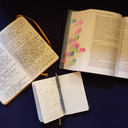Notes (September 6, 2019)
-
There, in this mind that is breathing right now,
There lies Enlightenment. Nowhere else.
Nothing is missing. Nothing is lost. Nothing is found.
There is no illusion, and no attainment. -
About Wu (Mu): I like to think it’s the answer of the dog. If you asked a dog, “Does a dog have Buddha nature or not?”, you’d get a well rounded Wu(f) : “What do you think?”
-
After a first investigation of Gateless Gate Case #1 (Chao-Chou’s dog or “Mu”), I wanted to restart my readings of Chan/Zen more or less in order, to understand the evolution of their Dharma. BodhiDharma, Huang-Po, Hui-neng. I wanted to understand the Zen understanding of Buddha Nature. I hope to be able to compile the notes and quotes here. I switched to Gateless Gate Case #2.
